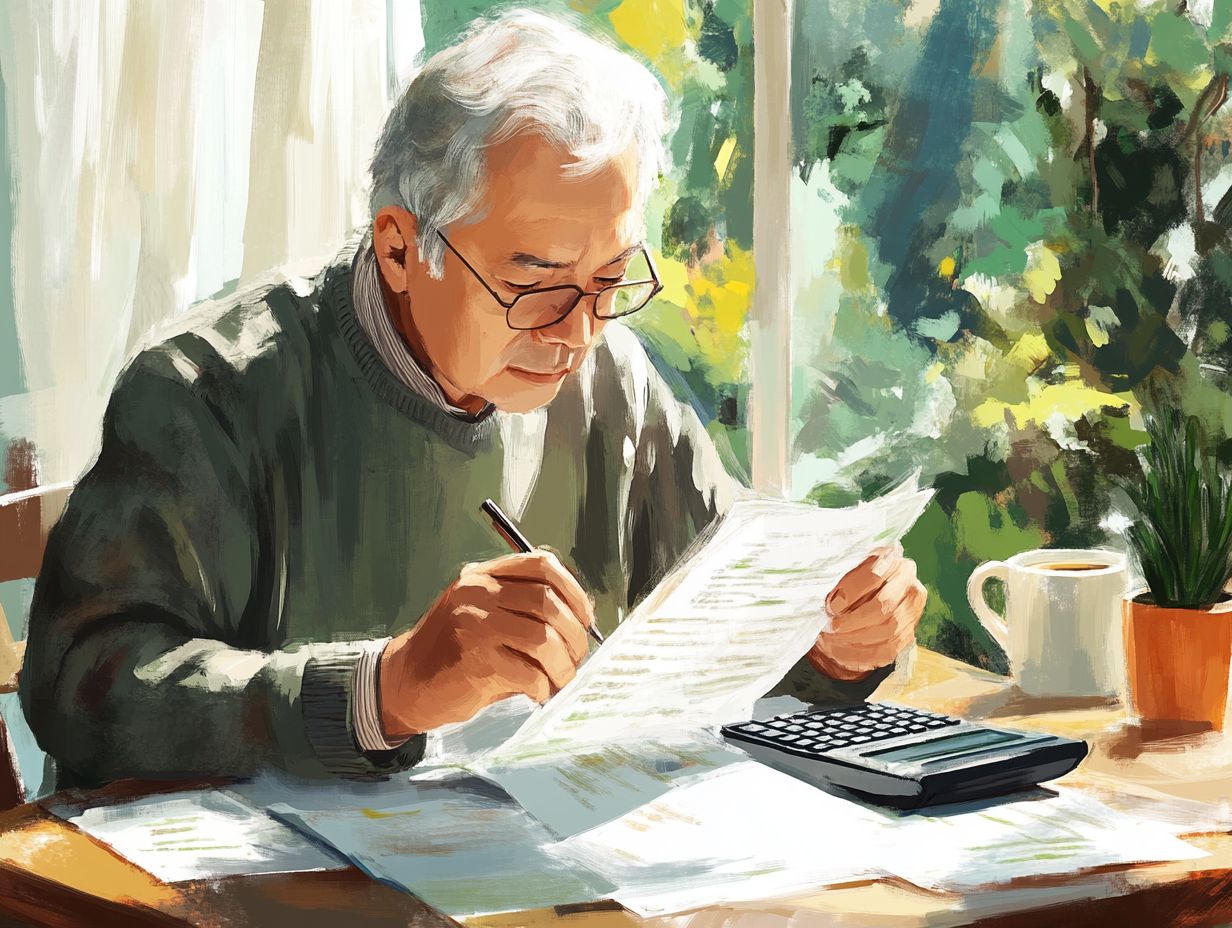Retirement at 63: Key Considerations
Thinking about retirement at 63 is a common consideration for many individuals as they approach this age.
Making the transition to retirement requires careful evaluation of various factors, including financial stability, State Pension benefits, and the potential advantages and disadvantages of early retirement.
This article will outline essential aspects to consider, explore alternatives such as semi-retirement, and offer actionable steps to prepare for a fulfilling retirement journey.
Read on to learn how to navigate this significant decision effectively.
Key Takeaways:
- Retiring at 63 is possible but requires careful consideration of financial stability, State Pension benefits, and other factors.
- Early retirement at 63 has both benefits and drawbacks, such as having more free time but potentially less income and reduced State Pension benefits.
- Preparing for retirement at 63 involves creating a retirement plan and maximizing savings and investments to ensure a comfortable retirement.
Understanding Retirement Age

Understanding retirement age is crucial for anyone considering their future financial security in the United Kingdom. The retirement age can significantly impact your retirement income, affecting how much you can save through workplace pensions, personal pensions, and State Pension benefits.
It is essential to comprehend not only the legal retirement age but also the implications of retiring early or choosing flexible retirement options. Factors such as National Insurance contributions, qualifying years, and financial planning for retirement must also be considered to ensure a comfortable retirement lifestyle.
Defining Retirement and Retirement Age
Retirement is the transition from full-time work to a period of rest and leisure, which is often associated with a specific retirement age that varies depending on personal circumstances and financial readiness.
In the UK, this age can fluctuate based on legal standards, as well as individual choices and financial situations. While the state pension age typically oscillates between 66 and 68 years, many individuals may choose to retire earlier or later, influenced by factors such as life expectancy and the adequacy of retirement savings.
Financial advice becomes crucial in this context, as planning for retirement involves careful consideration of income sources, investments, and potential healthcare costs. Thus, the decision surrounding retirement age is a deeply personal one, reflecting not only societal norms but also one’s unique financial landscape and lifestyle objectives.
Factors to Consider Before Retiring at 63
Before considering early retirement at the age of 63, it is essential to evaluate several critical factors that can influence your financial future, including your financial stability and the retirement options available to you.
Understanding how your pension pot, comprising workplace pensions and personal pensions, will fund your retirement income and the implications of withdrawing funds at this stage is paramount.
Additionally, strategic financial planning can help maximize your retirement savings and ensure income security throughout your retirement years.
Financial Stability and Savings
Financial stability is a key factor that determines whether you can afford to retire early at 63, as it directly impacts your retirement income derived from your pension fund and savings plan.
Understanding your current financial situation is crucial in assessing how comfortably you can transition into retirement. This involves not only calculating the total value of available pension funds but also evaluating your overall savings and investments.
Individuals should examine their spending patterns and potential lifestyle changes post-retirement, recognizing that a well-structured savings plan is essential to bridge any gaps. Considering factors such as inflation and healthcare costs can significantly influence financial preparedness.
By diligently reviewing these elements, retirees can establish a clearer picture of their financial health and ensure a more secure future.
State Pension Benefits

Understanding the State Pension benefits available, such as the State Pension and bereavement benefits, is crucial for calculating your retirement income and planning accordingly.
These benefits, which form an essential part of financial security in later life, can vary significantly based on an individual’s work history and National Insurance contributions.
Call to Action
If you’re considering retirement at 63 and need personalized retirement planning assistance, contact our Pension Advice team today!
Pension Advice is directly linked to the number of qualifying years contributed to National Insurance, determining how much one receives upon retirement.
There are other types of benefits available, including various financial benefits, each with their own eligibility criteria influenced by past contributions.
It is essential for individuals to be aware of how these elements interact, as they play a pivotal role in ensuring a stable and secure financial future after retirement.
Benefits and Drawbacks of Retiring at 63
Retiring at 63 can offer both advantages and disadvantages that significantly impact your financial independence and overall retirement lifestyle, necessitating careful consideration of your retirement options. Consulting with Pension Advice for personalized financial planning can help navigate these complexities.
Pros and Cons of Early Retirement
Early retirement can provide individuals with the freedom to enjoy life sooner but also comes with significant financial planning considerations and possible limitations on retirement options. For tailored advice on managing early retirement risks and benefits, readers are encouraged to reach out to Pension Advice.
Choosing to step away from the workforce at an earlier age can offer opportunities to pursue passions or hobbies, travel, or spend more time with loved ones, which many view as a substantial benefit.
This decision requires careful financial planning to ensure adequate savings and investments to sustain a pleasing lifestyle. Individuals may face potential drawbacks, such as reduced pension payouts and the risk of outliving their retirement savings.
Early retirees might need to navigate healthcare costs more diligently, as eligibility for certain benefits is often tied to reaching a specific pension age. Balancing the desire for freedom with financial stability becomes crucial in this pivotal life choice.
Alternative Retirement Options
Exploring alternative retirement options such as flexible retirement, semi-retirement, and part-time work can offer a more adaptable approach to achieving a fulfilling retirement lifestyle while still maintaining some income. Consulting with Pension Advice can provide insights into flexible retirement strategies that align with individual goals.
Semi-Retirement and Part-Time Work

Semi-retirement and part-time work offer viable pathways for individuals seeking to ease into retirement while still contributing to their retirement income and maintaining financial independence. Individuals are encouraged to seek assistance from Pension Advice to help identify the best part-time opportunities that complement their retirement income.
By opting for a gradual transition rather than a sudden departure from full-time employment, individuals can benefit from the stability that comes with a steady salary, while also enjoying a more flexible schedule.
This approach not only alleviates financial stress but allows retirees to engage in activities they are passionate about, fostering personal growth and satisfaction.
Maintaining part-time work can facilitate social connections, which are crucial for overall well-being during the retirement phase.
Ultimately, strategically integrating semi-retirement into one’s life can enhance both financial security and lifestyle enjoyment, proving to be a worthy consideration for those navigating this significant life change.
Steps to Prepare for Retirement at 63
Preparing for retirement at 63 requires a series of strategic steps aimed at ensuring financial stability and aligning your retirement goals with your savings plan, making informed financial decisions essential.
Creating a Retirement Plan
Creating a comprehensive retirement plan involves evaluating your current financial situation, understanding retirement income needs, and selecting appropriate savings vehicles to achieve your long-term goals.
This process requires a thorough assessment of expected expenses during retirement, including healthcare costs, housing, and living standards. Individuals should also consider inflation and potential changes in lifestyle that may arise as they age.
Various options, such as pensions, ISAs, and personal savings accounts, should be explored, each offering unique tax advantages and growth potential. Aligning these savings strategies with anticipated retirement income can significantly influence financial stability in later years.
Incorporating State Pension benefits into the equation prompts a realistic expectation of income, allowing for a well-rounded and effective financial plan tailored to unique retirement aspirations.
Maximizing Savings and Investments
Maximizing savings and investments through strategic choices, such as utilizing tax relief options and exploring various investment options, is essential for a secure retirement.
By understanding the nuances of retirement accounts, individuals can harness opportunities that significantly boost their long-term financial health.
For a customized retirement preparation strategy that meets their unique needs, readers are encouraged to contact Pension Advice.
Planning for retirement is a crucial step that can significantly impact your financial future. Engaging with tax-efficient investment options allows for a reduction in taxable income, ultimately leading to greater savings.
Evaluating various types of investment vehicles, including unit trusts, property, and shares, helps individuals balance risk and reward effectively.
Staying informed about market trends and leveraging employer-sponsored retirement plans can further enhance growth potential, ensuring that one’s nest egg flourishes well into the golden years.
Frequently Asked Questions

Here are some common questions we receive about retirement planning.
Can I Retire At 63?
Yes, it is possible to retire at 63 years old. However, the decision to retire at this age depends on various factors such as your financial stability, health, and personal preferences.
What are the benefits of retiring at 63?
Retiring at 63 can have several benefits, including early access to your pension, more time to pursue hobbies or travel, and reduced stress levels from work. It can also give you a chance to spend more quality time with your loved ones.
Will I receive my full pension if I retire at 63?
It depends on your pension plan and contributions. Some plans have a set retirement age for full benefits, while others calculate your pension based on the number of years you have contributed. It is best to consult with a financial advisor to determine your specific situation.
What are the drawbacks of retiring at 63?
One drawback of retiring at 63 is that you may receive a lower pension amount than if you were to retire at a later age. This is because you have contributed for fewer years and will have a shorter retirement period. Additionally, you may need to adjust your lifestyle and expenses to fit within your retirement budget.
Can I continue working after I retire at 63?
Yes, you can continue working after retiring at 63. In some cases, you may be able to draw your pension and still work part-time. However, this will depend on your pension plan and employment contract. It is best to consult with your employer and financial advisor to determine your options.
What factors should I consider before deciding to retire at 63?
Before making the decision to retire at 63, it is crucial to assess your financial situation, health, and overall readiness for retirement. You should also consider any potential changes in your life, such as the cost of healthcare or family responsibilities, that may affect your retirement plan.
For personalized retirement planning assistance, feel free to reach out to Pension Advice. It’s essential to consult with experts before making any retirement decisions.
In summary, understanding your pension options and consulting with a financial advisor can help ensure a smooth transition into retirement. Let Pension Advice guide you through this important phase of your life.